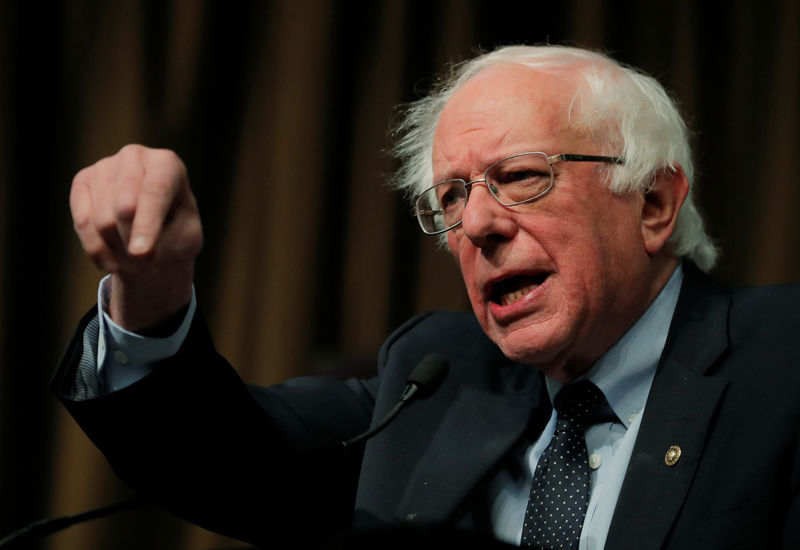By John Whitesides
NEW YORK (Reuters) - Democratic presidential contender Bernie Sanders, courting the black voters who did not support his 2016 White House run, drew a sharp personal contrast on Friday with what he called President Donald Trump's racist policies.
Sanders, a U.S. senator from Vermont, told a crowd of African-American activists that his push for economic equality, including universal healthcare, free public college and a higher minimum wage, would help ease the country's racial wealth gap.
"Like many of you here, I have been fighting for economic, social and racial justice. As this presidential campaign begins, I believe that is the defining difference between President Trump and me," Sanders said at the Reverend Al Sharpton's National Action Network in New York.
"Donald Trump is a man who has said he believes Nazis and white supremacists are 'very fine people,'" Sanders said, a reference to Trump's comments after violence at a white supremacist march in Charlottesville, Virginia in 2017.
"I am the son of an immigrant whose family was murdered by the Nazis, and so, from a very young age, I knew that we must stand up to bigotry wherever it exists."
Sanders, whose father was an immigrant from Poland, struggled to win black support in his losing 2016 Democratic primary race against Hillary Clinton, who along with her husband, former President Bill Clinton, had proven appeal to black voters.
Since launching his 2020 presidential campaign, Sanders has made an effort to emphasize his history of civil rights activism and make an explicit case for how his economic policies would benefit African-Americans.
'HE HAS LIVED UP TO EVERYTHING'
At the conference, Sanders drew words of praise from Sharpton, who has said he will not endorse a Democratic candidate until later in the year. Sharpton reminded the crowd, however, of his breakfast in Harlem with Sanders at the height of the campaign for president in 2016.
"I can say in the two years since, he has lived up to everything he has said to me and more. I want you to know he has done what he said," Sharpton told the crowd.
Sanders was one of seven Democrats who spoke to the conference on Friday. Five others in the growing Democratic 2020 White House field appeared at the conference earlier in the week.
The candidates have backed an array of policies to close the racial gap in economic equality, improve access to healthcare and institute criminal justice reforms including eliminating cash bail, outlawing the death penalty, legalizing marijuana and wiping clean the records of non-violent drug offenders.
Democrats in the 2020 race have intensified their outreach to black voters this year following the first decline in African-American turnout in 20 years during the 2016 election, which helped sink Hillary Clinton and contributed to Trump's stunning upset victory.
The historically diverse 2020 Democratic field includes black, Hispanic and openly gay candidates, as well as a record six women so far.
U.S. Senator Elizabeth Warren raised the prospect in her speech of eliminating the Senate filibuster, the procedural rule that requires a 60-vote supermajority in the 100-member chamber, for legislation, saying it had been used through history to block civil rights and other bills.
Democrats eliminated the filibuster for some executive branch and lower-level judicial appointments when they controlled the Senate under Democratic President Barack Obama. Senate Republican leader Mitch McConnell has curtailed it further to apply to Supreme Court nominations.
Eliminating the filibuster for legislation would be a significant escalation of the partisan battle that has raged in Congress in recent years.
"For generations, the filibuster was used as a tool to block progress on racial justice. And in recent years, it’s been used by the far right as a tool to block progress on everything," Warren said.
"When Democrats have the White House again, if Mitch McConnell tries to do what he did to President Obama, and puts small-minded partisanship ahead of solving the massive problems facing this country, then we should get rid of the filibuster," Warren told the conference.
